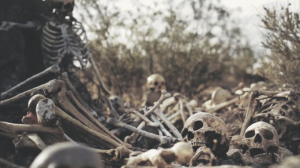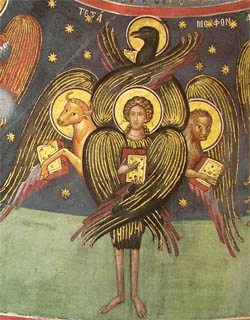====================
This sermon was preached on the Fifth Sunday in Lent, April 6, 2014, at St. Paul’s Episcopal Church, Medina, Ohio, where Fr. Funston is rector.
(The lessons for the day were: Ezekiel 37:1-14; Psalm 130; Romans 8:6-11; and John 11:1-45. These lessons can be read at The Lectionary Page.)
====================
 Let’s just do a bit of bible study today. I think we’ll see a common theme in the three lessons.
Let’s just do a bit of bible study today. I think we’ll see a common theme in the three lessons.
First, the very familiar prophetic vision of the “valley of dry bones” from the Book of Ezekiel. Scholars date this prophecy to about 587 BCE. Ezekiel was one of those taken into exile by the Babylonians ten years earlier in 597 BCE. The Babylonians had laid siege to Jerusalem for almost two years, creating conditions of famine, disease, and despair. They destroyed the city of Jerusalem, razed the temple to the ground, killed many of its inhabitants, and forced the rest to migrate to Babylon. This is how the Babylonian conquest is described in the Second Book of Kings, from the paraphrase entitled The Message:
[In] the ninth year and tenth month of Zedekiah’s reign, Nebuchadnezzar set out for Jerusalem immediately with a full army. He set up camp and sealed off the city by building siege mounds around it. The city was under siege for nineteen months (until the eleventh year of Zedekiah). By the fourth month of Zedekiah’s eleventh year, on the ninth day of the month, the famine was so bad that there wasn’t so much as a crumb of bread for anyone. Then there was a breakthrough. At night, under cover of darkness, the entire army escaped through an opening in the wall (it was the gate between the two walls above the King’s Garden). They slipped through the lines of the Babylonians who surrounded the city and headed for the Jordan on the Arabah Valley road. But the Babylonians were in pursuit of the king and they caught up with him in the Plains of Jericho. By then Zedekiah’s army had deserted and was scattered. The Babylonians took Zedekiah prisoner and marched him off to the king of Babylon at Riblah, then tried and sentenced him on the spot. Zedekiah’s sons were executed right before his eyes; the summary murder of his sons was the last thing he saw, for they then blinded him. Securely handcuffed, he was hauled off to Babylon. In the nineteenth year of Nebuchadnezzar king of Babylon, on the seventh day of the fifth month, Nebuzaradan, the king of Babylon’s chief deputy, arrived in Jerusalem. He burned The Temple of God to the ground, went on to the royal palace, and then finished off the city — burned the whole place down. (2 Kgs 25:1-9)
Ezekiel, a young apprentice priest, experienced this. The religious institution he served, the Jerusalem Temple, was destroyed and he was reduced from a prominent position as a priest in Jerusalem to that of a temple-less priest in exile. God then pegged him to become a prophet to the exile community; he tells us in the very first sentence of his book that he “was among the exiles by the river Chebar, the heavens were opened, and [he] saw visions of God.” (Ezek 1:1)
But not only did Ezekiel experience this historical trauma common to all the exiles to a greater or lesser extent, he experienced deep personal loss as well: his wife died and God commanded him not to mourn her. Again, I am reading from The Message:
God’s Message came to me: “Son of man, I’m about to take from you the delight of your life — a real blow, I know. But, please, no tears. Keep your grief to yourself. No public mourning. Get dressed as usual and go about your work – none of the usual funeral rituals.” I preached to the people in the morning. That evening my wife died. The next morning I did as I’d been told. (Ezek 24:15-17)
God’s command for him not to mourn her was to serve as an example for the exile community not to mourn the loss of the Temple.
I don’t know about you, but if I had to endure what Ezekiel and his contemporaries went through I would be a deeply depressed person! I would sink into the depths of despair. And that is what the exiles did. The psalms speak eloquently of their desperation: “By the waters of Babylon we sat down and wept, when we remembered you, O Zion.” (Ps 137:1; BCP version) Other psalms speak for the exiles in their sadness, their weariness settling deep within them. Psalm 31, for example:
Have mercy on me, O Lord, for I am in trouble;
my eye is consumed with sorrow, and also my throat and my belly.
For my life is wasted with grief, and my years with sighing;
my strength fails me because of affliction, and my bones are consumed.
(Ps 31:9-10, BCP version)
Or Psalm 102:
Incline your ear to me;
when I call, make haste to answer me,
For my days drift away like smoke, *
and my bones are hot as burning coals.
My heart is smitten like grass and withered, *
so that I forget to eat my bread.
Because of the voice of my groaning *
I am but skin and bones.
(Ps 102:2-5; BCP version)
Or Psalm 6:
Have pity on me, Lord, for I am weak; *
heal me, Lord, for my bones are racked.
My spirit shakes with terror; *
how long, O Lord, how long?
(Ps 6:2-3; BCP version)
In these psalms and elsewhere in the Hebrew Scriptures, the reference to “bones” is an idiomatic way of referring to one’s deepest self, a way for a person or a community to refer to its most essential self. And so we have Ezekiel’s vision of “dry bones,” a vision of the soul of the exile community. “Mortal,” says God, “these bones are the whole house of Israel.”
Since the dry bones represent the living exiles, we can see that this vision is not concerned with death; death here is a metaphor for the soul-deep desperation, the despair of the exiles. The exiles, bereft of their nation, their city, and (most importantly) their Temple, fear that God has abandoned them. Ezekiel speaks to this hopelessness with a startlingly simple metaphor of divine presence, the immediate closeness of breath, the pervading presence of wind. In just fourteen verses, the Hebrew word ruach occurs nine times, translated as “breath” in verses 5, 6, 8, and 10), as “wind” in verse 9, or as God’s own spirit in verse 14. The prophet’s repetitive use of the word drums the point of the message into his hearers’ consciousness: God’s spirit is the key. With God’s spirit, anything is possible. And God’s spirit is as close as the wind, as close as one’s own breath; there is no place on earth, no instant in time, and no situation of sin that can separate God’s people from God’s spirit. Not the loss of one’s country, one’s city, one’s Temple, even one’s beloved spouse; nothing! God’s spirit is always and everywhere present.
Which brings us to the Epistle lesson taken from the eighth chapter of Paul’s letter to the church in Rome. “To set the mind on the flesh is death,” writes Paul, “but to set the mind on the Spirit is life and peace.” (Rom. 8:6) We need first to understand that Paul’s use of “flesh” is not a reference to the physical body. The body is ethically neutral for Paul; it is neither good nor bad in and of itself. There certainly is nothing wrong with having a body. When Paul writes about the body, he uses the Greek word soma.
In this passage, however, he uses the word sarx, which means “flesh,” as in meat. Paul uses the word in Romans in two ways. First, he uses it to describe physical descent between ancestor and descendant. In the opening greetings of the letter, Paul identifies Jesus as a descendant of David “according to the flesh” (Rom 1:3) and later himself as a Jew because of “Abraham, our ancestor according to the flesh.” (4:1) In this sense, it is largely neutral, but in this sense also it can be negative. For Paul salvation or righteousness before God is not an honor due a particular blood line or a family heritage; it is not by the flesh but by the spirit of God that the followers of Jesus, the members of the community of faith receive life and peace.
In the second way in which Paul uses sarx or “flesh,” Paul is influenced by the dualism of his age which considered the flesh to be imperfect because it is capable of deterioration. Under that philosophical influence, Paul assigns to flesh negative characteristics such as death, hostility to God, and an incapacity to live according to God’s law. When a person’s focus in life is on the flesh and its appetites, that is a focus on death because the flesh does not last. “But,” Paul reassures his readers, “you are not in the flesh; you are in the Spirit, since the Spirit of God dwells in you.” Notice that, like Ezekiel’s message to the exiles in Babylon, Paul’s message is one for the present; not a promise of a future relationship with God, but an assurance of a present one.
Paul believes that this relationship with God is a present reality; it is not a something that exists somewhere else or that is coming in the future. Paul is certain that it is real, it is here, and it is now; because of the life, death, and resurrection of Jesus Christ this new reality is here today. Throughout the rest of this Chapter 8 he will develop his argument that we are currently children of the Father, that we are currently brothers and sisters of Christ, that we currently possess the gifts of the Spirit, and that we are currently enjoy the real and present love of God. He concludes this chapter asking:
Who will separate us from the love of Christ? Will hardship, or distress, or persecution, or famine, or nakedness, or peril, or sword? * * * No, in all these things we are more than conquerors through him who loved us. For I am convinced that neither death, nor life, nor angels, nor rulers, nor things present, nor things to come, nor powers, nor height, nor depth, nor anything else in all creation, will be able to separate us from the love of God in Christ Jesus our Lord. (Rom 8:35,37-39)
For Paul and for us, God is everywhere and always present.
And so we come to the Gospel lesson — another familiar story from the Gospel of John — the raising of Lazarus, a story about what it means to be in relationship with Jesus, what it means to love him and be loved by him. Lazarus is identified by his sisters to Jesus as “he whom you love,” (v. 3) and then John underscores this by telling us that “Jesus loved Martha and her sister and Lazarus.” So in the way Jesus related to this Bethany family we get a clue of what it is to be in relationship with him. And what we learn, perhaps distressingly, is that doesn’t mean that one is protected from bad stuff. John’s Gospel makes this painfully obvious, for in this Gospel, love is linked inextricably to death.
Remember that what is perhaps the best known verse of Christian scripture is from this Gospel: “For God so loved the world that he gave his only Son . . . . ” (Jn 3:16) And it is in John’s Gospel that Jesus says, No one has greater love than this, to lay down one’s life for one’s friends.” (Jn 15:13) So it is with this family; that they love Jesus and he loves them does not mean that bad things, including death, do not happen. Lazarus dies.
And in John’s story, Jesus does not prevent it, nor even arrive until afterward. He is met on the road by Lazarus’ sister Martha who confronts him, “Lord, if you had been here, my brother would not have died.” (v. 21) In response, Jesus assures her that “your brother will rise again.” (v. 23), but she hears only the promise of a future resurrection: “I know that he will rise again in the resurrection on the last day.” (v. 24) And Jesus, “I am the resurrection and the life.” (v. 25) Note, if you will, the verb: Jesus’ reply is in the present tense — “I am . . . .”
The resurrection is not a distant promise; it is not a guarantee of salvation in the future; it is not about an eternal life with God and Jesus in heaven. In the next few chapters of John’s Gospel we will encounter Lazarus reclining at the table with Jesus, sharing food and fellowship. (Jn 13:28) His new relationship with Jesus is intimate and close; it is here and now. For Lazarus and for us, the resurrection is not a future with Jesus; it is a present with Jesus. Jesus is present with Lazarus and his sisters; he is present with us, and through him God is glorified even in that which feels irredeemably bad and painful.
Being in relationship with Jesus, loving him and being loved by him, does not mean that unpleasant things do not happen. It means that when they do, he faces them, even death and grief, with us. It means learning that, in spite of the worst the world can do, the worst that flesh can be subject to, even death and the finality of the grave, Jesus is the resurrection and the life. Nothing is ever so dead that it keeps him from being that in himself and for us. In John, the resurrection is not a future hope; it is the abundant life which is always here, always now. Nothing, as Paul reminded the Romans, not “death, nor life, nor angels, nor rulers, nor things present, nor things to come, nor powers, nor height, nor depth, nor anything else in all creation, [can] separate us” from it. It is, as Ezekiel prophesied to the exiles, as close as the wind, as close as one’s own breath; it is always and everywhere present.
Amen.
====================
A request to my readers: I’m trying to build the readership of this blog and I’d very much appreciate your help in doing so. If you find something here that is of value, please share it with others. If you are on Facebook, “like” the posts on your page so others can see them. If you are following me on Twitter, please “retweet” the notices of these meditations. If you have a blog of your own, please include mine in your links (a favor I will gladly reciprocate). Many thanks!
====================
Father Funston is the rector of St. Paul’s Episcopal Church, Medina, Ohio.
 Let’s just do a bit of bible study today. I think we’ll see a common theme in the three lessons.
Let’s just do a bit of bible study today. I think we’ll see a common theme in the three lessons. In thinking about yesterday’s readings, I suggested that the Lenten question we should be asking one another is not “What are you giving up?” but “What are you rejoicing about?” Along comes Paul today and tells the church in Caesarea Philippi, “Rejoice in the Lord always; again I will say, Rejoice” (v. 4) following up with this list of things to consider, things about which we might rejoice.
In thinking about yesterday’s readings, I suggested that the Lenten question we should be asking one another is not “What are you giving up?” but “What are you rejoicing about?” Along comes Paul today and tells the church in Caesarea Philippi, “Rejoice in the Lord always; again I will say, Rejoice” (v. 4) following up with this list of things to consider, things about which we might rejoice. Look up cherub in a secular dictionary and this is what you find: “a member of the second order of angels, often represented as a beautiful rosy-cheeked child with wings.” (Collins) I don’t know why, when, or how the fat little boys with aerodynamically inadequate wings came to be an artistic and now normative depiction of cherubs, but there it is! Technically, these little guys (and they are male) are known as putti — an Italian plural; the singular is putto. (Putto is occasionally used in modern Italian to mean a male toddler.)
Look up cherub in a secular dictionary and this is what you find: “a member of the second order of angels, often represented as a beautiful rosy-cheeked child with wings.” (Collins) I don’t know why, when, or how the fat little boys with aerodynamically inadequate wings came to be an artistic and now normative depiction of cherubs, but there it is! Technically, these little guys (and they are male) are known as putti — an Italian plural; the singular is putto. (Putto is occasionally used in modern Italian to mean a male toddler.)
 I thought, “Surely, this is wrong! There can’t be anything as weak and lifeless in Scripture (especially in the Psalms) as the plaintive little cry, ‘I’m sorry . . . .'” So instead of the New Revised Standard Version, I turned to The Book of Common Prayer, sure that I would find a stronger statement, perhaps “I repent.” But, no. The BCP version of this psalm is really even worse because it renders the verb in the future tense: “I will confess my iniquity and be sorry for my sin.” Come on! “I will be sorry”? Really?
I thought, “Surely, this is wrong! There can’t be anything as weak and lifeless in Scripture (especially in the Psalms) as the plaintive little cry, ‘I’m sorry . . . .'” So instead of the New Revised Standard Version, I turned to The Book of Common Prayer, sure that I would find a stronger statement, perhaps “I repent.” But, no. The BCP version of this psalm is really even worse because it renders the verb in the future tense: “I will confess my iniquity and be sorry for my sin.” Come on! “I will be sorry”? Really?

